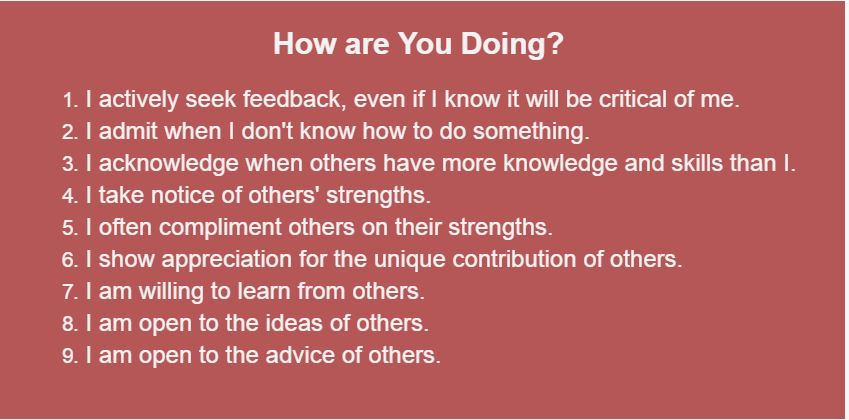We’ve all encountered at least one. An individual in a position of power, or not, that ‘knows it all’. They lead over people with the “tacit assumption” that life is fundamentally and always a competition. That, as leaders, they are being paid for fixing problems rather than for fostering breakthrough thinking. Between their deep attachment to the answer—any answer—and their anxiety about not knowing, they have inadvertently thwarted the collective capacity for deep creativity and fresh perspectives.
Nearly three-quarters of employees report that the worst aspect of their job is their immediate boss (Hogan and Kaiser 2005), and many of the complaints employees have about their leaders appear to reflect the dimensions of arrogance; devaluing the opinions or views of others and thinking they have all the answers or having an inflated self-view.
Watch .48seconds where Axelrod from the movie Billionaires re enforces the message of the ‘Keflar’ of Knowing …all the answers, and demonstrates his non growth mindset by suggesting that only his experience is what matters without appreciating others’ physiology, psychology, beliefs, values etc
|
 |
So what does humility mean? Is it a multifaceted, adaptive strength? Is it associated with humiliation and lowliness? What are the expressed behaviours of humility and how are these behaviours perceived by others? What’s the impact of humility on organisational outcomes?
Humility in general has been categorised as a temperance virtue that guards against excess and expressed humility as an interpersonal characteristic that emerges in social contexts that connotes:
(A) a manifested willingness to view oneself accurately,
(B) a displayed appreciation of others’ strengths and contributions, and
(C) teachabilityThough individuals may have a baseline penchant for expressing humility that is based on heredity, socialisation and life experience, the expression of a person’s humility may vary according to contextual cues and circumstances.
(A) The Willingness to See one-Self Accurately
People with humility have self-views that are focused on their interdependence with others rather than their independence from others. It’s the Interaction with others that pushes us to constantly collect information about ourselves and our environment and therefore expressed humility is primed, catalysed, and reinforced through interactions with others. In addition, humble people utilise interactional partners as “social mirrors” through which they can more accurately see or gain an accurate reflection of themselves by being transparent about strengths and limitations.Humility fosters a more objective appraisal of personal strengths and limitations that is demonstrated by transparent disclosure of personal limits, acknowledging mistakes and seeking realistic feedback about oneself. This in turn leads to better psychological health and higher general well-being. This is in contrast to individuals with self-enhancing and and inaccurately positive self-perception, often measured by contrasting self-views with those of observers. These individuals tend to be more maladjusted over the long term, be more deceitful, have a more brittle ego-defense system, have less social poise and presence and be less productive.
In an organisational context, expressed humility has implications for the quality of interpersonal work relationships, decision making, and subsequent performance. Employees who engage in this self-learning through interactions with others gain a more accurate awareness of their own intrapersonal resources and will be less prone to overconfidence, which is the root of a myriad of organisational problems, poor decisions, and self-complacency.
Obviously, this overconfidence is especially dangerous in those who hold power in organisations, such as those in leadership roles. A balanced or more accurate self-awareness helps organisational members and leaders know more accurately when to take action and when to learn more about an issue, as well as which endeavors they are capable of handling competently and which should not be attempted because of incompetence or inexperience. As past research has shown, self-disclosure often leads to increased trust, relational satisfaction, and reciprocal disclosure (Ehrlich and Graeven 1971, Collins and Miller 1994).
Those who overestimate their ability may allocate less time and effort than is needed, resulting in missing deadlines or sacrificing quality to finish tasks on time, thereby leading to decreased performance.
(B) The Appreciation of Others’ Strengths and Contributions
“Humility is an increase in the valuation of others and not a decrease in the valuation of self.” Means et al. (1990, p214).Expressed humility allows individuals to transcend a comparative–competitive response when interacting with others and instead acknowledges and admires the strengths and contributions of others without feeling threatened by them. This suggests that true humility is more about possessing an exalted view of the capacities of others rather than a negative view of oneself.
Research has found that when individuals are given power they tend to devalue the worth and contributions of others (Kipnis 1972). I propose that organisational leaders and members who possess humility can transcend this tendency and instead maintain a genuine appreciation and high valuation of the efforts, strengths and abilities of their coworkers. By attending to the qualities of others, humble organisational members will more likely hold a non-heuristical, complex view of others (i.e., viewing others through a multifaceted lens that sees a variety of character strengths and skill sets others possess) and less likely to hold simplistic, dualistic evaluations of others (i.e., competent versus incompetent).
(C) Teachability
Templeton (1997, p. 162) noted, “Inherent in humility resides an open and receptive mind … it leaves us more open to learn from others.”This aspect of expressed humility would be demonstrated by receptiveness to others’ feedback, ideas and advice with the willingness to ask for help. The ability of organisational members to learn effectively is critical for organisations competing in the present knowledge economy. The rapid advance of technology and increasing specialisation of work suggest that organisations are in greater need of leaders and employees who are teachable and have a desire and willingness to acquire new skills, absorb new information and learn from others.
Humble individuals, through showing teachability, afford others a sense of voice, which has been shown to foster greater trust, motivation, and a heightened sense of justice. When a leader is able to humbly admit, “I don’t know,” that admission forces the leader to drop pretense, drop omniscience, drop expert authority, drop a macho posture, and drop monologues with Listening-Up and exploring being the outcome.
Increasingly, firms are organising workers into teams in hopes of fostering synergies of experience, skills and knowledge, as well as to encourage mutual mentoring and peer regulation. Research has shown, however, that the intended benefits of organising around teams are often not realised because team member characteristics may starkly contrast with expressed humility. Members who display characteristics such as self-enhancement and arrogance are punished by other team members because of their disruptiveness to group functioning (see Anderson et al. 2006, Horowitz et al. 2006). In contrast, the behaviours of expressed humility facilitate effective team functioning and make it more likely that team members will view humble team members as quality contributors to the team’s efforts.
Leaders who show the behaviours of humility help legitimise learning and personal development, sending a signal to employees that it is okay to be “in process” and foster openness, trust, and recognition, which have been shown to be antecedents of learning goal orientation.
Take Aways
(1) look for, (2) recognise, and (3) appreciate the development of new competencies and skills;
Admit your own mistakes and limitations;
Model teachability and openness to learning;
Acknowledge the strengths and contributions of team members;
Present a realistic view of yourself (i.e., awareness, of weaknesses and mistakes);
Loosen your mental and emotional grip on the tools that enabled your success thus far and the control that comes with power;
Be open to the ideas of others;
Give employees due credit for their contributions and strengths;
Train for Courageous Conversations: training for adopting a dialectical approach to not defining things in terms of what one imagines them to be in a certain abstract moment, but by what they have the potential to become through generative, courageous dialogue;
Ask questions – the sound of one person talking is not, obviously, a conversation – you have to learn to lean out a little bit so that others can lean in;
Foster CuriosityIn contrast to “rousing” employees through charismatic, energetic and idealistic leadership approaches, studies suggest a “quieter” leadership approach with listening, being transparent about limitations and appreciating follower strengths and contributions as effective ways to engage employees.
If you’ve enjoyed reading my blog, don’t keep it to yourself, please share it.
Get in touch, I’d love to be of service.


